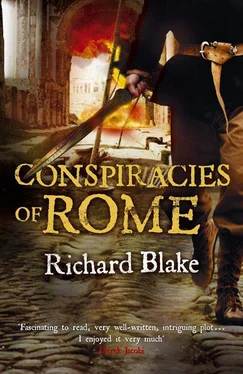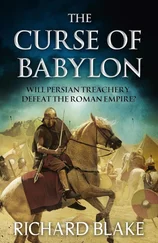Richard Blake - Conspiracies of Rome
Здесь есть возможность читать онлайн «Richard Blake - Conspiracies of Rome» весь текст электронной книги совершенно бесплатно (целиком полную версию без сокращений). В некоторых случаях можно слушать аудио, скачать через торрент в формате fb2 и присутствует краткое содержание. Жанр: Исторические приключения, на английском языке. Описание произведения, (предисловие) а так же отзывы посетителей доступны на портале библиотеки ЛибКат.
- Название:Conspiracies of Rome
- Автор:
- Жанр:
- Год:неизвестен
- ISBN:нет данных
- Рейтинг книги:3 / 5. Голосов: 1
-
Избранное:Добавить в избранное
- Отзывы:
-
Ваша оценка:
- 60
- 1
- 2
- 3
- 4
- 5
Conspiracies of Rome: краткое содержание, описание и аннотация
Предлагаем к чтению аннотацию, описание, краткое содержание или предисловие (зависит от того, что написал сам автор книги «Conspiracies of Rome»). Если вы не нашли необходимую информацию о книге — напишите в комментариях, мы постараемся отыскать её.
Conspiracies of Rome — читать онлайн бесплатно полную книгу (весь текст) целиком
Ниже представлен текст книги, разбитый по страницам. Система сохранения места последней прочитанной страницы, позволяет с удобством читать онлайн бесплатно книгу «Conspiracies of Rome», без необходимости каждый раз заново искать на чём Вы остановились. Поставьте закладку, и сможете в любой момент перейти на страницу, на которой закончили чтение.
Интервал:
Закладка:
They looked mainly to be in late middle age – most balding, and with lean, saggy faces. As I entered – Martin was taken off to the slave quarters – they were stuffing themselves from dishes of what smelt like bad cabbage served by a few scrawny slaves. The few lamps were of good bronze workmanship, but were burning meat dripping rather than oil. They threw out as much foul smoke as light, and I walked in to stinging, streaming eyes.
‘We bid welcome to Alaric of Britain,’ a particularly dirty old man cried, pulling himself up from his couch. A battered wreath on his head, he was the host, I gathered. His name had been on the invite, though I forgot this almost at once, and it is unlikely to come back into my memory now. All eyes turned in my direction, and there was a little round of applause.
‘Here is the one who slew twelve barbarians with his own hand, yet is versed in all the wisdom of our ancient fathers,’ he went on. ‘Accept, O golden hero from the farthermost land of unending night, the welcome and gratitude of the mighty Roman Senate!’ The host raised his wine cup in greeting, or to have it refilled.
I was led to a couch at the front of the room where I could be seen, and was invited to arrange myself on it. This had once been a fine piece, and still had some of its ivory trimming. But it was warped and cracked with age, and there was a long, black stain running down its length where generations of greasy togas had rubbed against it. I carefully lay down, glad to have ordered other clothes from the tailor Marcella had recommended.
The food looked as bad as it smelt. I swear some of the smaller and less obviously bad meats were baked rat. I avoided the meats of whatever kind, and the uncooked dried fish. I accepted a dish of olives that didn’t look too mouldy, and crunched on some stale bread that still had the papal dole mark on its underside. The wine was surprisingly good, and I sipped on this without mixing in any of the brackish water I was offered.
Never mind the attendant circumstances, it’s the quality of conversation that really makes a gathering. As you might expect, though, this was dire. The everyday language of these people was the radically degraded Latin of the City. It’s easier for us barbarians: we learn Latin as a foreign language, and can, if not always do, learn its purest form. And the dialect can even be forcefully expressive when spoken with feeling, as I could hear when Marcella really lost her temper. But in their mouths, it sounded grotesque. Their drawls were so exaggerated and slow, I almost wanted to finish their sentences for them. Anything they did say in the pure language had obviously been got from the classics, adapted for its purpose, and carefully memorised. There was no conversation as this is normally understood. Instead, the guests made little set speeches, looking in my direction whenever about to say something they thought specially apt. They generally spoke of their present wealth and the glorious deeds of their ancestors. One gave a long description of his alleged estates in Africa that, when he could remember the correct order of words, scanned as elegiac couplets. Some of this was clever enough to bear listening to, though I never did learn the name of the poet.
At length they thought me sufficiently impressed by this display of leisured learning, and fell silent, indicating it was my turn to speak.
I gave the usual brief and censored account of my journey to Rome. It shouldn’t have taken that long to get through, only everyone kept interrupting me with expressions of wonder at how well I spoke. ‘Such milky copiousness of words!’ one exclaimed. ‘Such grace and purity of diction!’ cried another.
Someone else asked if the sun ever shone in England, and if there were headless giants in London. When I ignored the second question and explained that the weather was wetter and cooler than in Italy, they gave me a round of applause, then raised their cups. ‘The first Alaric took Rome by starvation,’ someone with stained false teeth and a slipping wig simpered, ‘this Alaric has taken it by storm!’
When the applause for that – admittedly spontaneous – witticism had died away, another added: ‘He has the name of the uncouth barbarian, Alaric, but surely the face and body of the Grecian Apollo.’ More applause. More raising of cups.
Dear God, I thought to myself, how much longer? Maximin was snoring happily in his bed. Gretel would soon give up on me for the night and go to her own. And here I was, pinned down by a pack of bores whose grandfathers had probably used their last worthwhile books to cook dinner.
‘But surely you embarrass our young friend with such flattery? Let us respect his simple modesty.’ This was a new voice, young and firm and unaffected. It came from the back of the room. I strained through the smoky gloom and saw someone who’d come in late or whom I’d missed when I first came in. About thirty, well dressed, with a neat little black beard and hair very close cropped, but for a neat fringe that hung over his forehead, he sat on his couch with a napkin between it and himself. He swung his trousered legs back and forth. Like me, he was ignoring the food but making free with the wine.
‘Lucius!’ Our host reared up again. ‘I’m so glad you could make our company. How delightful to see you again.’
‘How was Constantinople?’ the wigged man asked Lucius. ‘Caesar is well?’
Lucius stretched his legs and took another sip of the wine. ‘Both were about as well when I left them as one might expect,’ he said. ‘The Persians are rampaging through Syria. There are Slavs pouring across the Danube. The exarch of Africa has revolted. His Eternal Gloryship Phocas, Ruler of the Universe, is quaking in his palace. He’s run out of everything he can tax or borrow, and is now murdering his way through the Senate so he can confiscate enough to keep his guards in wine and whores and the scum of Constantinople quiet with chariot races. I could hardly tear myself away from the place.’
The wigged man turned serious. ‘Is it that bad?’ he asked. ‘Will the East fall like we did?’ He paused suddenly, looking round. ‘Naturally, I take it for granted that Caesar will be victorious – ever triumphant.’
‘I shouldn’t worry about informers,’ Lucius said with a slight note of scorn. ‘In Constantinople, yes. They are everywhere. You can’t fart without worrying someone might twist it into a treason. But not here in Rome. There’s bugger all here worth confiscating – unless you’re desperate enough to lay hands on Holy Mother Church. In any event, His Holiness stands between us and Caesar.
‘As for the military collapse, yes, that is bad. I think the Persians mean what they say. I don’t believe this time they are interested only in a bit of plunder and a few indemnities to buy them off. They want permanent rule over Egypt and Syria, which are the only provinces left in the Empire that can pay tribute. And I think they’ve made a deal with the Slavs. The attacks I heard about were too close in time and purpose to be accidental.
‘I promise you – the next time those Eastern senators come visiting their cousins here, they won’t be so stuck up about our faded grandeur. They’ll be down at the Lateran, cadging their own tickets for the bread dole.’
His words came in quick, nervous bursts, with flashes of profound bitterness. As he finished, the room stayed silent. There was nothing more to be said. Rome had gone. Everywhere else had gone. Only Constantinople remained for these broken-down wretches as the bright beacon of civilised order in a world turning visibly grey. Eventually, some old man at the back asked in a quavering voice if any oil would be included in the next papal dole. A debate gradually started up – more natural and interesting than anything I’d yet heard. They even sat up on their couches into a more normal position.
Читать дальшеИнтервал:
Закладка:
Похожие книги на «Conspiracies of Rome»
Представляем Вашему вниманию похожие книги на «Conspiracies of Rome» списком для выбора. Мы отобрали схожую по названию и смыслу литературу в надежде предоставить читателям больше вариантов отыскать новые, интересные, ещё непрочитанные произведения.
Обсуждение, отзывы о книге «Conspiracies of Rome» и просто собственные мнения читателей. Оставьте ваши комментарии, напишите, что Вы думаете о произведении, его смысле или главных героях. Укажите что конкретно понравилось, а что нет, и почему Вы так считаете.












